What Susan Kim Taught Me
Looking for a positive way forward from the Susan Kim saga

It has been just over one month since the news of Councillor Susan Kim signing a letter questioning the rape of innocent Israeli women, wearing a Palestinian keffiyeh during council meetings and liking a Tweet which celebrated the resolve of Hamas (literally on the day of the Oct 7th attack). One month since her actions made international headlines, showcasing the political extremism that lives comfortably in our city. One month since our provincial MLA, the Minister of Municipal Affairs, and the Premier himself had to issue comments concerning her actions. And what has happened in that month? What consequences has Susan Kim faced due to her tremendously poor judgement as an elected official?
Absolutely nothing.
But that does not mean there are not many lessons to be learned here, important lessons that could guide us moving forward from this sad episode into a place of change and sanity for our city. I want to share a few things I learned from Susan Kim—her supporters and opponents—throughout this saga in this newsletter. And I would like to end positively, providing some inspiration for a potential way forward.
The first thing I learned from the Susan Kim saga is regarding the Code of Conduct and, specifically, the lack of an ability for private citizens to lodge complaints of their own. The need to go through an elected councillor automatically makes the process political because the consideration for action from any elected official will (understandably) almost always be political.
For example, a private citizen who, through their regular interaction with an elected official, feels that professional conduct may have been breached is required to obtain the approval of those same elected officials to generate a complaint under the Code. We’ve essentially politicized every possible issue that could arise under the Code because the only avenue for citizens to initiate a complaint is through a political body.
The measurement is not objectively whether a breach of professional conduct defined under the Code occurred on a fair balance of probabilities, but rather whether the political will on the council-of-the-day exists to advance a complaint formally and whether it is worth spending the political capital. These are two measurements that exist far apart from one another.
In the end, elected officials with political power through the council can avoid facing consequences even if their actions meet an objective definition of contraventions within the Code.
In the case of the Susan Kim saga, we saw immediately as her peers on the city council, who work with her to advance a common political agenda regardless of how others at the table may feel, remained approvingly silent throughout the news coverage. Ironically, this group holding a majority and ramming their ideas through is precisely how the present Code of Conduct came to be, even with Mayor Marianne Alto outright saying it was a bad idea to prevent a citizen complaint process. And those councillors who disapproved of Susan Kim’s actions publicly have no possible recourse through the Code because the ones who support Kim are the majority.
The professional conduct of an elected official should not be a political determination; it ought to be based on standards enshrined in the Code of Conduct itself and deliberated upon by an independent officer capable of taking complaints directly from private citizens. A de jure political majority on the council should refrain from quashing this ideal framework because it is fundamentally rooted in existing administrative and procedural fairness principles already present in many jurisdictions throughout British Columbia.
Another thing I’ve learned from the Susan Kim saga is how quickly both sides of the political spectrum will revert to entrenching themselves in ideological positions when faced with a challenging issue. I witnessed this unfold several times online, with Susan Kim supporters dismissing the entire saga as something coming solely from “conservatives” or “her usual enemies” and nothing more. I also saw it with people who associated Kim’s poor choices with wokism or progressive politics.
This ideological form around the issue was not helpful to the overall discussion. The suppositions themselves were also entirely unfounded. Colwood Councillor Ian Ward remains one of the most vocal voices against Kim on this issue, and he is anything but a conservative. He has rarely waded into the traditional fault lines in our regional politics.
As for Kim’s actions being rooted in some progressive conspiracy to undermine Canada, there was an announcement from NDP MLA Grace Lore and online statements from former Green Party leader Andrew Weaver calling out Kim and asking for an apology. This was not a partisan issue by any stretch of the imagination, yet that is where the online discussion went and remains.
The lesson to learn here is that your opponent is capable of and more than willing to sling ideological mud when faced with a problematic issue. This is true for both sides of the vocal political spectrum in Victoria politics. This happens because it is easy; a person will always feel more comfortable taking shots from a protected fort than out in the open field.
If you stick your neck out in the discussion, you had best be ready for an ideological onslaught in response no matter what side you are on, especially if you strike a particularly sensitive cord. We see this happen any time an issue around bike lanes is brought up online; not only does a whole army of typical accounts from the same typical people show up to dismiss the issue with ideologically charged language but many out-of-towners and people with very little connection to Victoria and the political scene show up as well.
The takeaway is that you ignore this response tendency at your peril. A good offence always considers the defence, so you can learn from their reactions in these little skirmishes and work it into your more extensive battle plans.
We are just getting this newsletter started and need as much support as possible. Please subscribe to show your support and get weekly updates sent directly to your email inbox as they are released.
The Susan Kim saga at its one-month mark might make you depressed. It certainly makes me feel that way. The fact that a sitting councillor can put her name to such an ignorant letter, wear a polarizing political symbol in council chambers with the full knowledge of how it makes entire segments of our society feel and like a tweet celebrating the resolve of a terrorist organization on the very day of a horrific attack and face no consequences is heartbreaking.
But an important thing I learned from this ordeal is that many people seem too willing to jettison their professed values when faced with the opportunity to bring political harm to their opponents. This found a home on the side concerned with Kim’s behaviour during the saga, specifically in calls for the provincial government to step in and remove Kim from office.
The very same people who, a few days before, bemoaned provincial government overreach and arbitrary decision-making because of the Airbnb regulations were now more than comfortable seeing Premier David Eby walk into the fray and remove an elected city councillor from office. That shocked me, and I addressed it directly through my Twitter account when I saw the call grow louder and louder among my peers.
The bar to remove an elected official from office should be higher than anything relevant to politics whether the removal is through recall legislation, by a higher government authority or by the courts. Imagine for a moment if Premier Eby acted on this call and set a precedent for such a thing. Fast forward a year, and imagine the left accuses Councillor Stephen Hammond of saying something offensive, and Premier Eby is pressed to force him out. We’d probably be dealing with the ousting call of the week under such a terrible scenario. No, thank you.
The truth is that Susan Kim was duly elected to serve her term, and our recourse against her actions ultimately comes down to the ballot box every four years. This is why, if you were paying attention during the last election, you would have heard me crudely say several times that all that matters is that you win. No one cares about your grand ideas or master plans if you don’t win because you can’t enact anything if you don’t win.
Susan Kim won, and the election was fair and legal. The mere suggestion of undemocratically overturning the people’s will—even if perceived to be in your favour (this time)—should cause you to jealously protect the democratic rights our political ancestors toiled so hard to achieve.
And this brings us to a way forward.
There is one reason why Susan Kim has faced no consequences for her poor decisions. Well, 4,817 reasons, to be more precise. Because 4,817 is the difference in votes between Susan Kim and the next person on the ballot with the potential to break up the Fabulous Four majority, Steve Orcherton. And that number should more accurately be 3,083 because that is the difference between Orcherton and the Fab Four bloc member who earned the least votes, Councillor Dave Thompson.
Just think, all things being equal, to effect real change in Victoria, what is required is to break the Fab Four majority and bring more perspective to the council. Those 3,083 votes are why Susan Kim got away with what she did and why we have a sorry excuse for a Code of Conduct in Victoria rather than the gold standard in the province.
That is a significantly large number, 3,083. It represents increasing Orcharton’s vote by nearly 1/3 earned from the previous election. That is a tall order for any political campaign. But I have more numbers for you, bringing more hope into the picture.
Remember that most eligible voters did not vote in the previous election. Only around 37% did. That means over 60% of eligible voters could be engaged, counted, tracked and dragged to the polls to bring about change. In the previous election, 47,121 people didn’t bother voting. Considering the 3,083 votes needed to replace just one of the Fab Four on the council, that is only 6.5% of those people. In theory, six point five percent of the unengaged is all you need to engage to bring about positive change!
And how can we do this? It takes real on-the-ground campaign work: word of mouth between friends, donating money to help campaigns and volunteering your time to help candidates you support, who would bring about the change you want. Essentially, it takes you being focused on the task of engaging the unengaged.
I end on this note: what are you going to do? How will you get out there and get those 6.5% new voters engaged, tracked and dragged to the polls in 2026? Because no one else will, only you can by getting focused on the task today. How will you ensure that elected officials like Susan Kim never get away with such hurtful and harmful behaviour again?



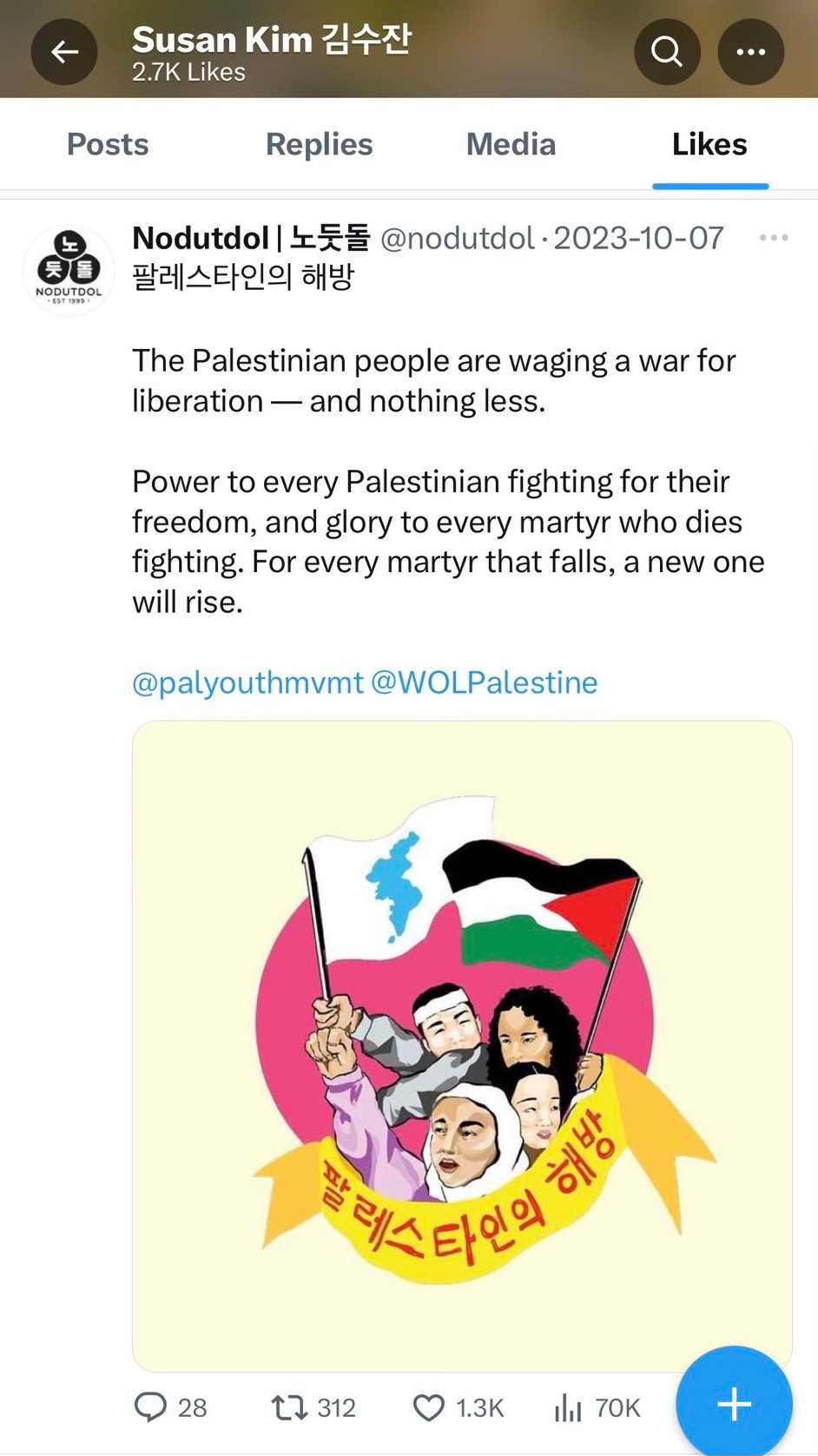
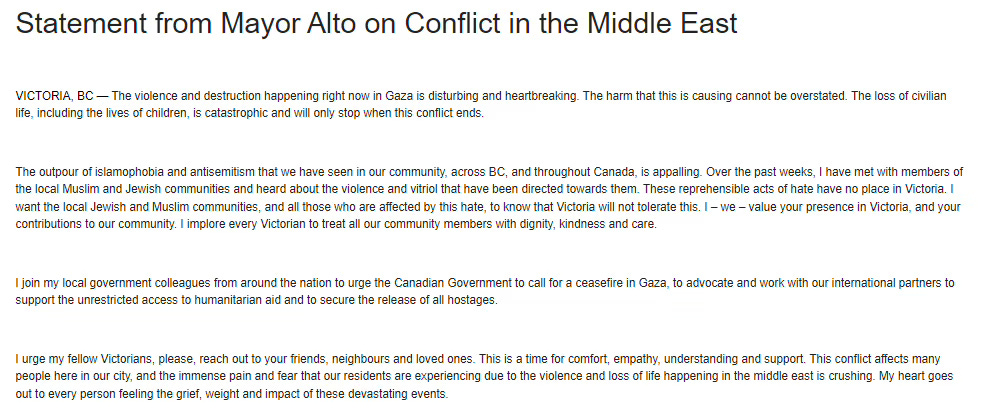

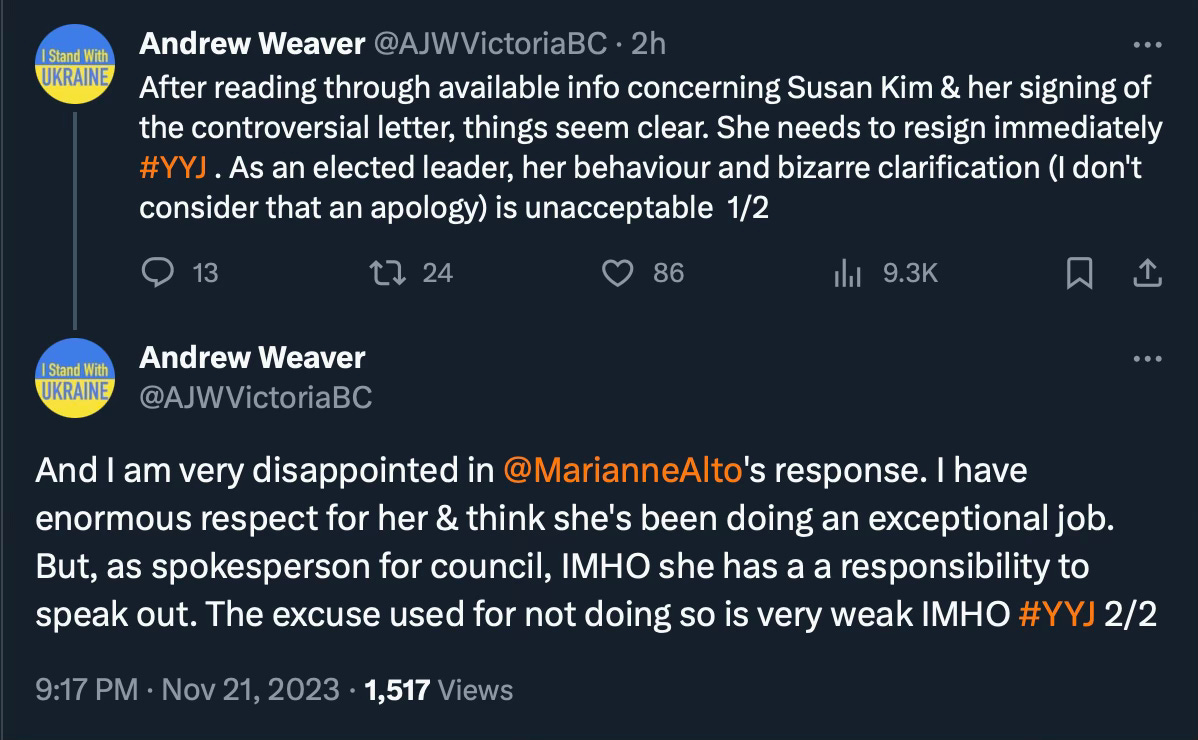
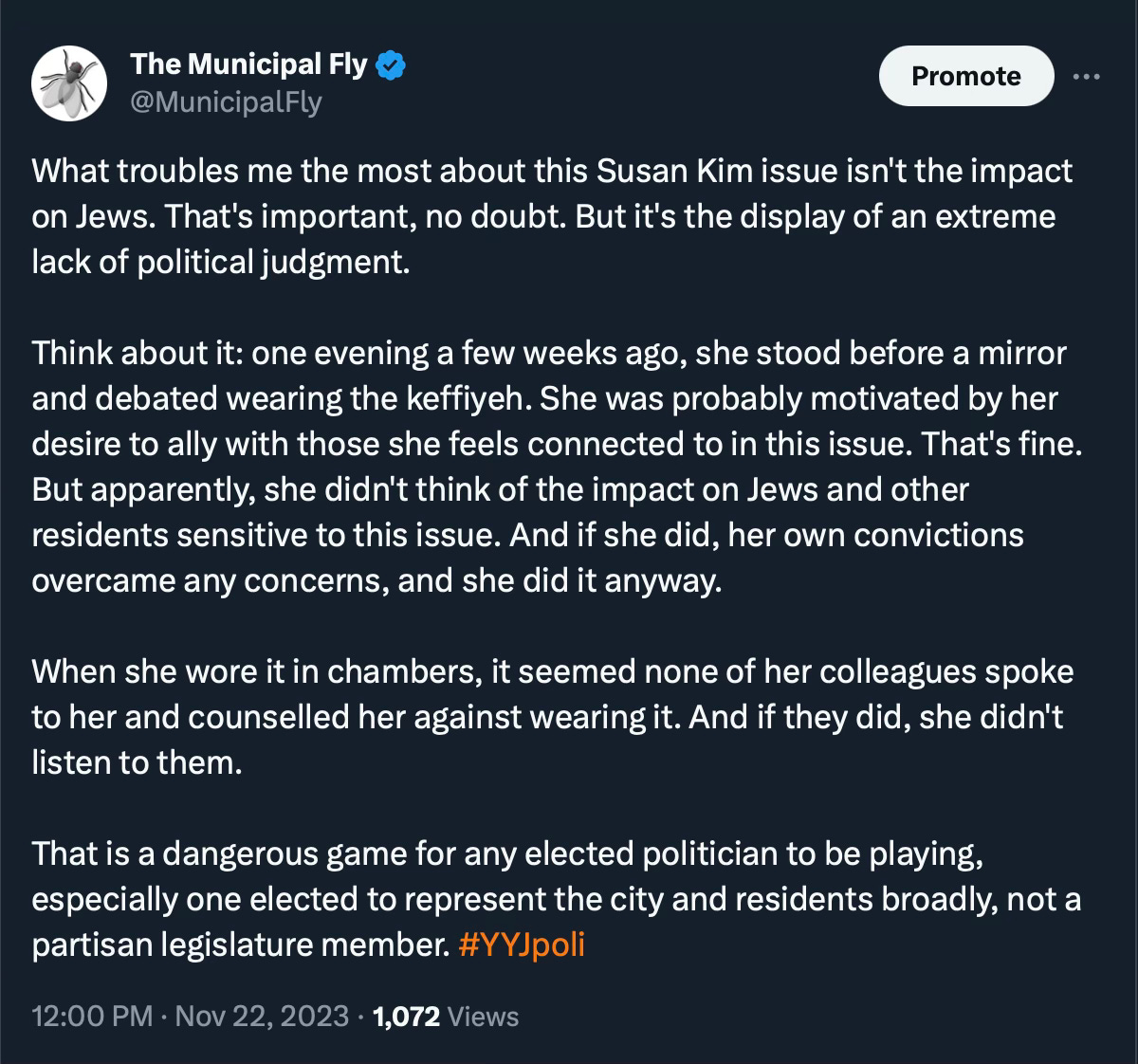
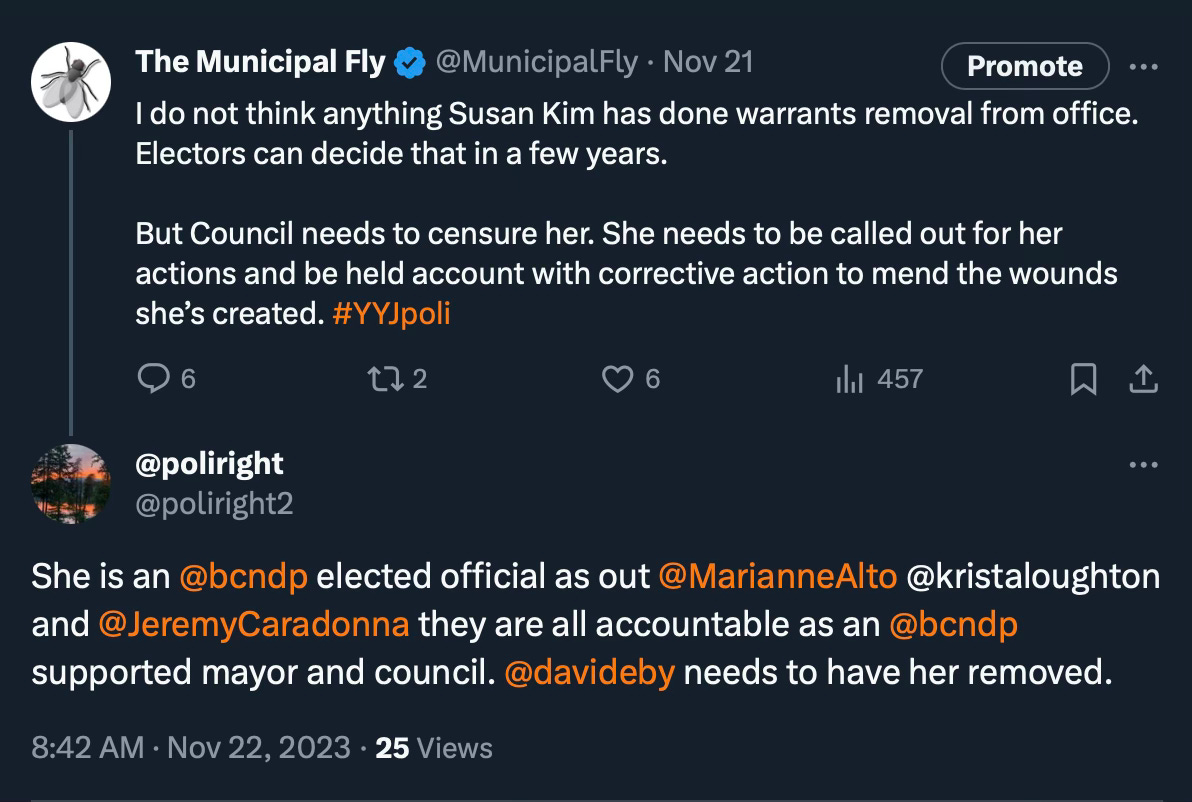

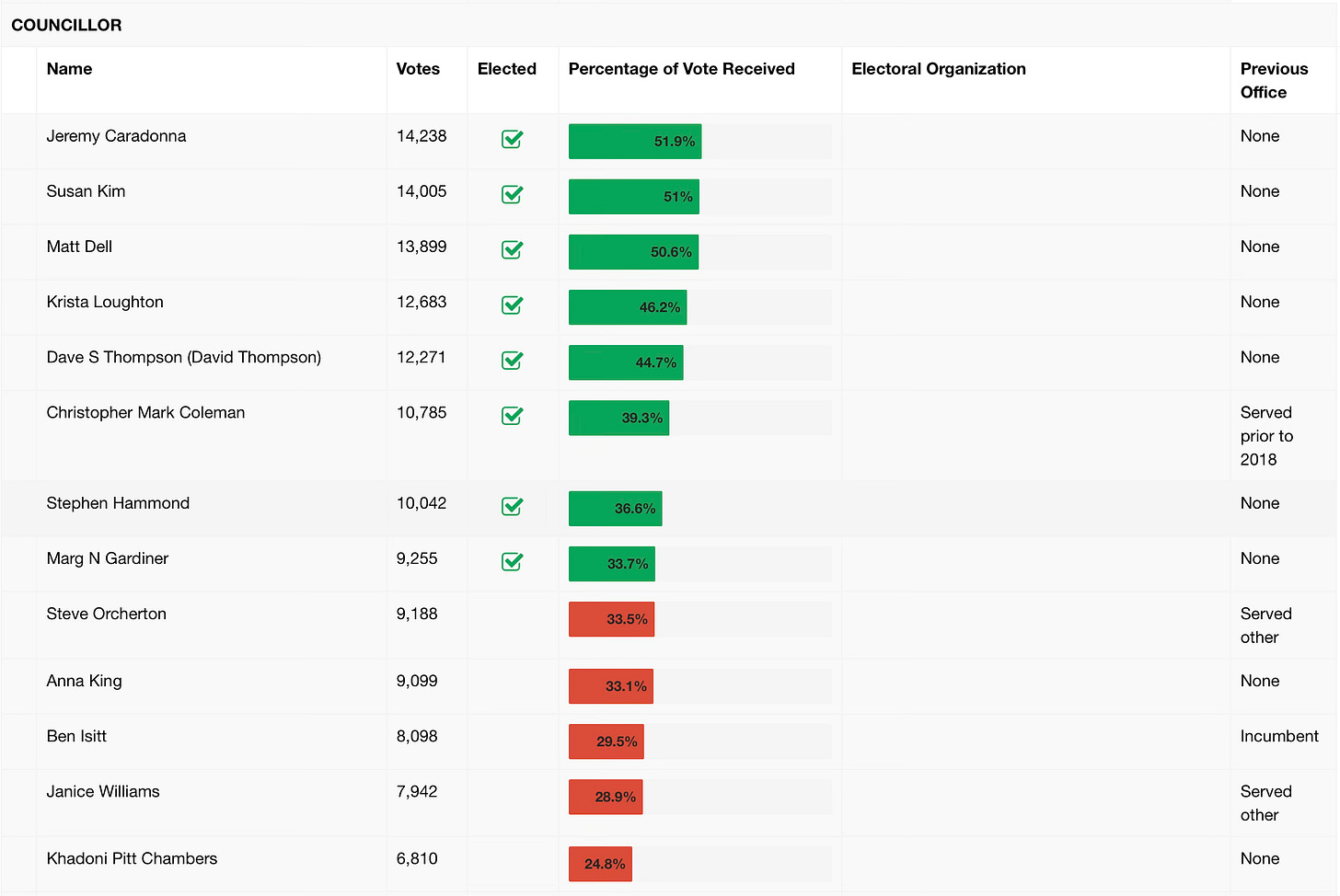


The tweet by Kim refers to an organization called "NODUTOL", which appears to be North Korean. The language on the website favours the reunification of Korea.
Another project of NODUTOL is to convince President Biden to reverse the travel ban to North Korea.
Kim was in Korea around the time thecinfamous letter was published. One could be forgiven for wondering whether she was in North Korea or South Korea.
I'm already doing it.
We have childish ideological capture in Victoria, espoused by people with no experience, no humility, and no love for the community. These folks, the "not-a-slate", had to lie about who they are in order to get elected. I wonder if they're proud...?
Tough, but not impossible to neutralize the failing NDP machines' manipulation of our small community. Very little effort has been brought to bear in recent elections, as your numbers prove, but next time might be different.